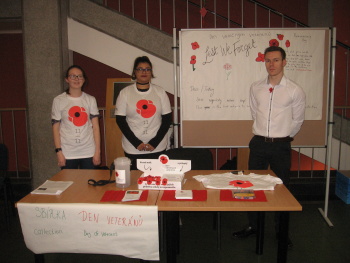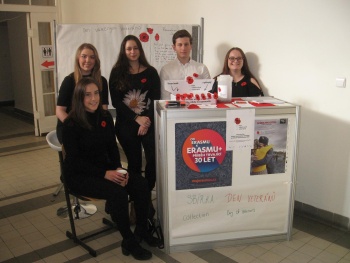Kashmeera Poona • 18 November 2017
Volunteering for Remembrance Day
Remembrance Day, also known informally as Poppy Day, is a day of memorial in the Commonwealth of Nations. The day was inaugurated by the British King George V in the year 1919 and is also a day of remembrance for many non-Commonwealth countries. The 11th of November is the day most countries recall the end of the hostilities of World War One in 1918. The warfare formally ended at the 11th hour of the 11th day on the 11th month. The day has been memorialized since the end of the First World War. It is a day set aside to remember, honour and celebrate the members of the armed forces who have died in the line of duty. Today it is not just in remembrance for those who lost their lives in the World Wars but also for those who have fallen in any battle big or small since then.
The Remembrance Poppy has become a familiar emblem of Remembrance Day due to the poem ‘In Flanders Fields’ by Canadian physician Lieutenant-Colonel John McCrae. In the poem he refers to red poppies growing over the graves of fallen soldiers:
“In Flanders fields the poppies blow
Between the crosses, row on row,
That mark our place; and in the sky
The larks, still bravely singing, fly
Scarce heard amid the guns below.”
Because of the poem, the poppy has become one of the most recognized memorial symbols for soldiers who have died in conflicts around the world. As part of the Memorial Day many countries have a tradition that at the 11th hour of the 11th day of the 11th month a one or two-minute silence is held throughout the country. 
Even today the 11th of November is held in the highest regard in the United Kingdom and many other countries so when Charles University decided to join the Memorial Day Event this year for the first time ever many of its current Erasmus students from Britain and Ireland were eager to volunteer their time.
Rebecca Barnes from the University of Southampton, on Erasmus in Prague hosted by the Faculty of Arts, stated: "Remembrance Day has always been a big deal back home, where the two-minute silence is observed in schools and workplaces alike, while many individuals buy a poppy to support veterans. Many cities, towns and villages were significantly affected by both World Wars, where so many men lost their lives. To this day families are affected by war, as soldiers are still sent overseas and too many still lose their lives serving our country. For my family specifically, Remembrance Day is important as both my grandfathers served in WWII, and so we spend the day honouring them, as well as all the other soldiers. While I understand why observing Remembrance Day might not be so ingrained in tradition in the Czech Republic, it seemed a shame not to honour the troops that have fought in the world wars as well as in the wars since 1989. Therefore, I decided to volunteer at the stall to try and help raise money to document their memories and recognise the sacrifice those men have made. It was great to see how many people wanted to support their troops. In fact, the support was so abundant that it surprised me the day was not more significantly celebrated prior to this year, as there was clearly a desire to observe the day.”
In total eight Erasmus students from Great Britain and Ireland supported the collection as volunteers. A stand was put up to promote the event and sell poppies. It was a part of the Information Day of Charles University in Albertov on Saturday 11th November and there was also a stand during afternoon of Monday 13th November in the foyer of the main building of the Faculty of Education of CU.
Jacob Bloor from the University of Sheffield, who volunteered on Monday and who studies Czech in Prague at the Faculty of Arts, shared: "Remembrance Day is something which is taken very seriously in the UK. We have been commemorating the sacrifices of our fallen soldiers from the First World War to the present day for nearly 100 years now, and I have participated in over 5 parades in my hometown. Furthermore, I have a personal interest in Remembrance Sunday, or Veteran's Day as it is known here in the Czech Republic, since I have relatives who have served our country in both World Wars. For me, it was an interesting experience commemorating Veteran's Day in another country, especially in a country where there is neither a great deal of public awareness nor interest on the matter. Nevertheless, I was glad to participate in helping out with selling poppies and collecting donations. I was particularly surprised by the number we sold and the interest taken by the students and staff. I hope that one day, there will be a greater general awareness of Veteran's Day in the Czech Republic.”
 Another student volunteer, James Rivett from the University of Kent, presently hosted by the Faculty of Social Sciences at CU, is part of the voluntary troops in Kent in the United Kingdom. He offered his recollection during the day of marching through Canterbury last year on the 11th of November; the voluntary troops were part of the parade all the way through the high street of Cantubury to the Canterbury Cathedral. When volunteering, James said: "It would be an honour to volunteer for Remembrance Day this Saturday." During Saturday he left the stall briefly to take two minutes silence in front of the building to honour the fallen, as is tradition in the UK.
Another student volunteer, James Rivett from the University of Kent, presently hosted by the Faculty of Social Sciences at CU, is part of the voluntary troops in Kent in the United Kingdom. He offered his recollection during the day of marching through Canterbury last year on the 11th of November; the voluntary troops were part of the parade all the way through the high street of Cantubury to the Canterbury Cathedral. When volunteering, James said: "It would be an honour to volunteer for Remembrance Day this Saturday." During Saturday he left the stall briefly to take two minutes silence in front of the building to honour the fallen, as is tradition in the UK.
In the Czech Republic the event is called Den válečných veteránů (War Veteran's Day) and it's organised by association Post Bellum. The collection supports their project Paměť národa (The Memory of Nation) which records mainly recollections of the veterans from World War 2, but also from later conflicts Czechoslovakia or the Czech Republic joined after 1989. At present in the Czech Republic there are 533 surviving veterans from World War 2 and 13 653 former soldiers from military conflicts after 1989 (Kuwait, Iraq, Balkan, Afghanistan or Mali). The project already recorded more than 800 stories of Czechoslovakian and Czech war veterans. The Veteran's Day is officially recognised by the Czech Law since 2001. This and the last year are however the first ones when the event has really been recognised in the Czech Republic - e.g. the TV reporters on the Czech state TV were wearing a poppy both years.
